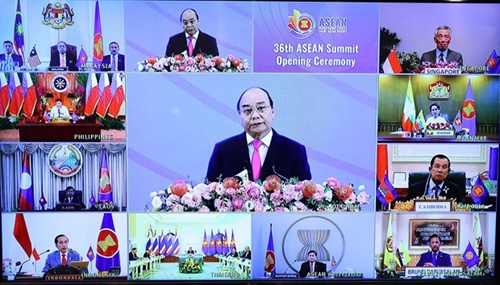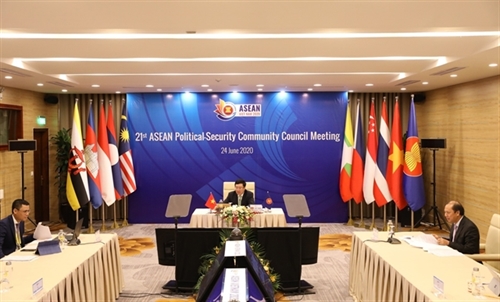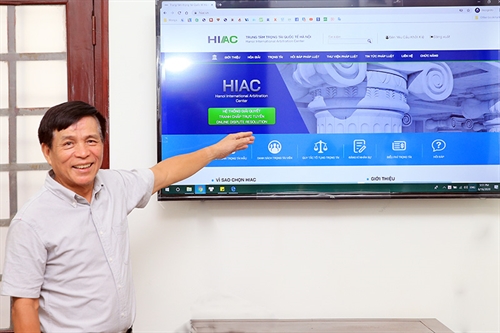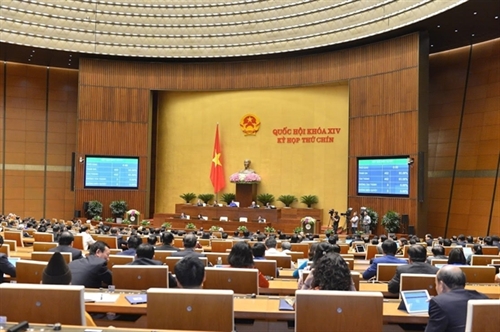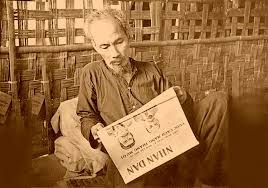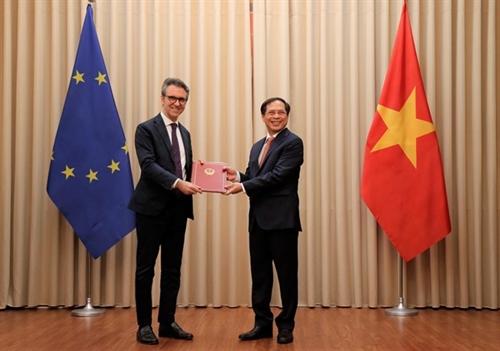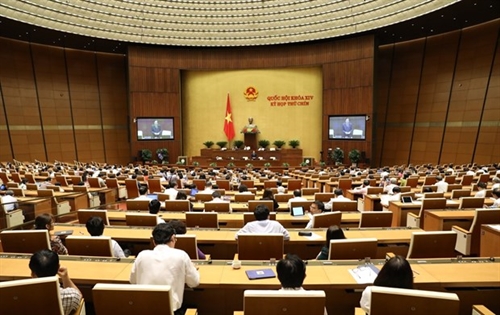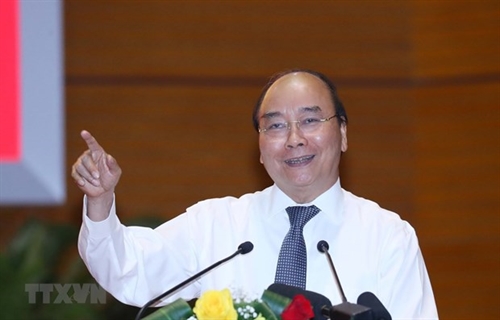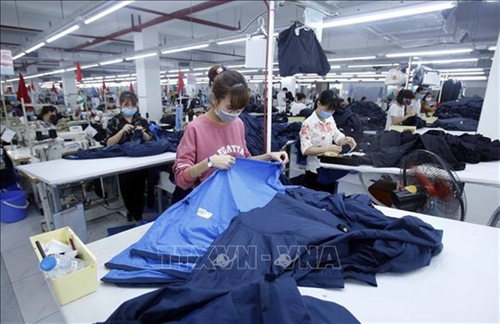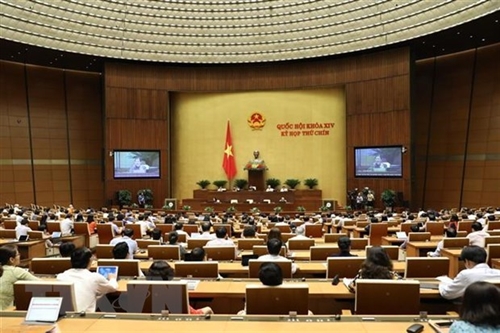Here is the full text of the ASEAN Declaration on Human Resources Development for the Challenging World of Work, which was adopted at the teleconferenced 36th ASEAN Summit on June 26.
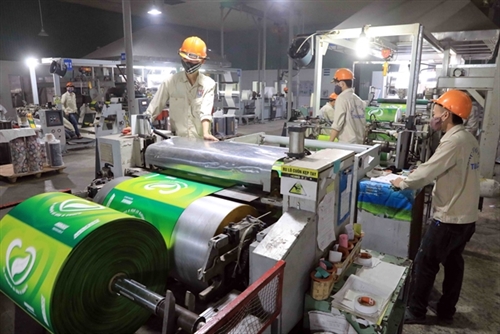 |
| Workers at a packaging company in the northern province of Hung Yen, Vietnam__Photo: VNA |
“WE, the Heads of State and Government of the Association of Southeast Asian Nations (hereinafter referred to as “ASEAN”), namely Brunei Darussalam, Kingdom of Cambodia, the Republic of Indonesia, the Lao People’s Democratic Republic (Lao PDR), Malaysia, the Republic of the Union of Myanmar, the Republic of the Philippines, the Republic of Singapore, the Kingdom of Thailand and the Socialist Republic of Viet Nam, held the 36th ASEAN Summit via video conference;
REAFFIRMING our commitment to the ASEAN Vision 2025 to build a people-oriented, people-centered ASEAN Community where our peoples enjoy higher quality of life and the benefits of community building;
RECALLING that one of the key purposes of ASEAN as stipulated in the ASEAN Charter is to develop human resources through closer cooperation in education and lifelong learning, and in science, technology and innovation, for the empowerment of the peoples of ASEAN and for the strengthening of the ASEAN Community;
REITERATING our commitment in the ASEAN Leaders’ Vision for a Resilient and Innovative ASEAN adopted at the 32nd ASEAN Summit to embrace the opportunities afforded by new technologies and innovation arising from the digital revolution, to implement smart and innovative solutions, as well as to improve digital connectivity that enhance the lives and livelihood of its people, while building resilience against potential disruptive effects;
FURTHER REITERATING the commitments in the ASEAN Labor Ministers’ Statement on the Future of Work: Embracing Technology for Inclusive and Sustainable Growth adopted in April 2018; ASEAN Labor Ministers’ Joint Statement on Green Initiative to the 108th International Labor Conference adopted in June 2019; ASEAN Declaration on Promoting Green Jobs for Equity and Inclusive Growth of the ASEAN Community adopted at the 33rd ASEAN Summit; Vientiane Declaration on Transition from Informal Employment to Formal Employment towards Decent Work Promotion in ASEAN adopted at the 28th and 29th ASEAN Summits; Bangkok Declaration on Advancing Partnership in Education for 2030 Agenda for Sustainable Development in ASEAN adopted at the 35th ASEAN Summit; ASEAN Declaration on Industrial Transformation to Industry 4.0 adopted by the 35th ASEAN Summit; and the Kuala Lumpur Declaration on Higher Education adopted at the 27th ASEAN Summit;
COGNISANT of the changing world of work due to technological advances, the demographic transition and greening economies, that offer both opportunities and challenges to the economies, industries and employment in the region;
COMMITTING to equip ASEAN’s human resources with the competencies that will prepare them to be future-ready, thereby enabling them to actively contribute to the sustainable development, competitiveness and resilience of ASEAN; protecting them from potentially negative impacts of disruptive technologies; enabling them to manage just transition; and ensuring that no one is left behind in this changing world of work; and
RECOGNISING the importance of collective efforts in the region and each Member State and greater involvement of businesses and industry to accelerate efforts in preparing ASEAN’s human resources for the future;
DO HEREBY:
Resolve to undertake the following actions, taking into account the capacities and resources of the respective Member States, to prepare the ASEAN human resources for the changing world of work:
Cultivate lifelong learning culture in societies and raise awareness of youth, workers and employers on the importance of investing in skills development to adapt to the changing world of work, including education and training;
Improve the inclusivity of education and employment for all especially with respect to improving access to and quality of skills training and job opportunities for all especially women, people with disabilities, elderly, those in rural or remote areas and those employed in small and medium enterprises;
Endeavour to have an articulated national policy framework and/or action plan on human resource development, towards improved policy coherence and given the cross-cutting concerns for HRD across the policy areas of education, training, and the labor market, and industrial development;
Enhance the responsiveness and cohesiveness of labor, educational, economic policies and institutional frameworks in promoting the following aspects towards better employment opportunities, employability, higher income, job security, quality of jobs and enterprise competitiveness, where relevant and within the framework of each Member State:
Innovations and the use of technology in teaching and learning approaches;
Educational systems that promote competencies that prepare all for lifelong learning and that promote 21st century skills, including green skills;
Competencies, productivity, job flexibility (including mobility) of workers;
Business models that incorporate re-skilling, up-skilling and new skills acquisition of workers; and
Mutual recognition of skills to support mobility of skilled labor.
Promote policies and initiatives for lifelong learning which encompasses key stages of education and training (i.e. basic education, technical and vocational education and training (TVET), higher education) and skills development in organizations that will meet current and future skills needs and allow occupational mobility and career development;
Enhance leadership of business, industry and educational institutions on human resources development by fostering closer partnerships between the government and private sector, and providing incentives and recognition to companies investing resources in skills training, internships and apprenticeships;
Promote the utility of TVET by portraying the decent and employment opportunities, school-to-work transition and career progression of TVET graduates; implementing advocacy campaigns; providing support to women, girls and underprivileged groups to enter non-traditional fields of TVET; and encouraging the harmonization of TVET competency standards and recognition in ASEAN Member States;
Promote demand-driven competencies and qualifications in TVET as well as in higher education by designing curricula and assessments, engaging qualified teaching personnel with up-to-date research on advanced technology that meets the labor market needs which leads to enhanced cooperation with education and training institutions which are industry based;
Improve accessibility and quality of labor market information, where appropriate, towards strengthened and coherent labor market information systems, including skills forecasts, to support the capacities of governments, educational institutions, business sector and other stakeholders to promote labor market-oriented education and trainings;
Promote infrastructure development to ensure access to crucial infrastructure such as on the internet and information technology, so that the opportunities presented by the Fourth Industrial Revolution may be widely enjoyed;
Strengthen/establish inter-agency bodies on human resource development across the areas of education, training, industrial development, and labor governance, towards improving policy coherence given the cross-cutting nature of human resource development;
Establish the ASEAN TVET Council (ATC) as a platform for coordination, research and development on innovations and monitoring of regional programs that support the advancement of TVET in the region;
Explore establishing a central pool of funds with contributions from governments, private sector, international organizations and other partners to support priorities and researches on future skills needs;
Strengthen cooperation and coordination of relevant ASEAN sectoral bodies, private sector, academia, tripartite partners and other stakeholders to facilitate ASEAN’s coordinated and holistic approach on human resources development; and
Strengthen cooperation between ASEAN and ASEAN’s external partners, including international organizations, to facilitate the sharing of models, good practices, and experiences in advancing human resources development in a changing world of work.
WE agreed to develop a roadmap for the implementation of this Declaration through concrete strategies and actions that will complement the work plans of the ASEAN Labor Ministers Meeting (ALMM), ASEAN Education Ministers Meeting (ASED), ASEAN TVET Council (ATC) and other relevant Sectoral Bodies.
WE tasked the ALMM and ASED, with the support of Senior Labor Officials Meeting (SLOM), Senior Officials Meeting on Education (SOM-ED), and ATC, to jointly coordinate the implementation of this Declaration including mobilization of resources, subject to the national laws, regulations and policies of Member States.
DONE on the Twenty Sixth Day of June in the Year Two Thousand and Twenty, in a single original copy, in the English language.”- (VNS/VLLF)
